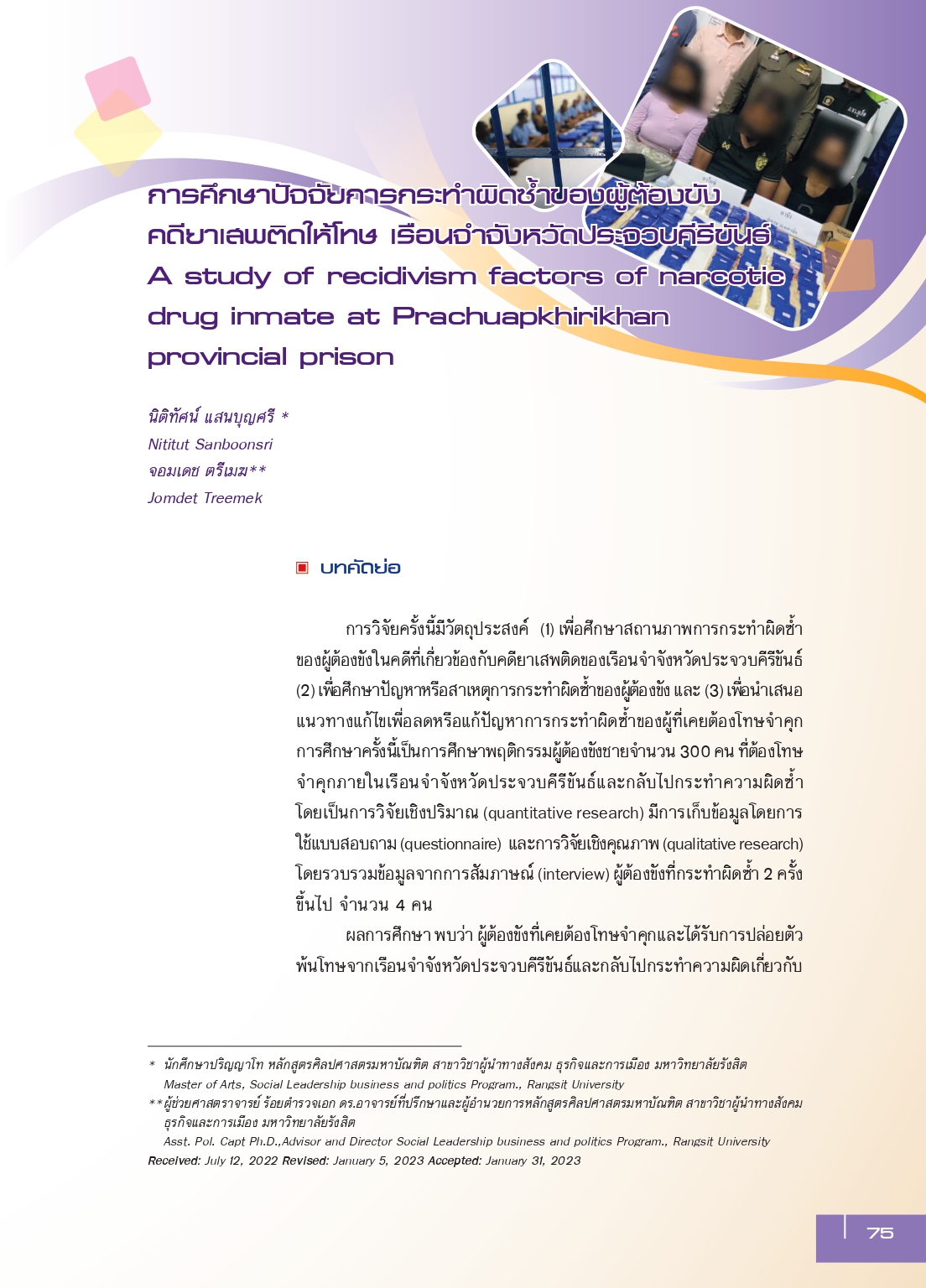การศึกษาปัจจัยการกระทำผิดซ้ำของผู้ต้องขังคดียาเสพติดให้โทษ เรือนจำจังหวัดประจวบคีรีขันธ์
Main Article Content
บทคัดย่อ
การวิจัยครั้งนี้มีวัตถุประสงค์ (1) เพื่อศึกษาสถานภาพการกระทำผิดซ้ำของผู้ต้องขังในคดีที่เกี่ยวข้องกับคดียาเสพติดของเรือนจำจังหวัดประจวบคีรีขันธ์ (2) เพื่อศึกษาปัญหาหรือสาเหตุการกระทำผิดซ้ำของผู้ต้องขัง และ (3) เพื่อนำเสนอแนวทางแก้ไขเพื่อลดหรือแก้ปัญหาการกระทำผิดซ้ำของผู้ที่เคยต้องโทษจำคุก การศึกษาครั้งนี้เป็นการศึกษาพฤติกรรมผู้ต้องขังชายจำนวน 300 คนที่ต้องโทษจำคุกภายในเรือนจำจังหวัดประจวบคีรีขันธ์และกลับไปกระทำความผิดซ้ำ โดยเป็นการวิจัยเชิงปริมาณ (quantitative research) มีการเก็บข้อมูลโดยการใช้แบบสอบถาม (questionnaire) และการวิจัยเชิงคุณภาพ (qualitative research) โดยรวบรวมข้อมูลจากการสัมภาษณ์ (interview) ผู้ต้องขังที่กระทำผิดซ้ำ 2 ครั้งขึ้นไป จำนวน 4 คน
ผลการศึกษา พบว่า ผู้ต้องขังที่เคยต้องโทษจำคุกและได้รับการปล่อยตัวพ้นโทษจากเรือนจำจังหวัดประจวบคีรีขันธ์และกลับไปกระทำความผิดเกี่ยวกับยาเสพติดให้โทษ จนกระทั่งกลายเป็น “ผู้กระทำผิดซ้ำ” และคนในสังคมตราหน้าว่า “ขี้คุก ขี้ตาราง” ผู้ต้องขังที่กระทำผิดซ้ำตั้งแต่ 2 ครั้งขึ้นไป มีอายุ 30-39 ปี โดยมีการกระทำผิดครั้งที่ 2 สูงที่สุด ผู้ต้องขังมีประวัติครอบครัวที่อบอุ่น มีความตั้งใจประกอบอาชีพ และหารายได้เลี้ยงครอบครัว เมื่อได้รับการพ้นโทษผู้ต้องขังประสบปัญหาในการประกอบอาชีพ ส่งผลให้มีรายได้ไม่เพียงพอ เกิดปัญหาทำให้ครอบครัวแตกแยก ร่วมกับมีความคิดว่า คนในสังคมดูถูกเหยียดหยาม นอกจากนี้ การกลับไปอาศัยอยู่ในชุมชนที่มียาเสพติดให้โทษแพร่ระระบาด จึงเป็นสาเหตุให้กลับไปกระทำผิดซ้ำอีกครั้ง สิ่งที่สำคัญอีกประการหนึ่ง คือ พฤติกรรมการต้องโทษจำคุก ได้เรียนรู้วิธีการ สถานที่ แหล่งจำหน่ายยาเสพติดให้โทษจากผู้ต้องขังในเรือนจำฯ เมื่อพ้นโทษ จึงได้กลับเข้าสู่วงจรยาเสพติดให้โทษ นอกจากนี้พบว่าการมีทัศนคติว่า “การติดคุก” ไม่ใช่การลงโทษและไม่เกรงกลัวต่อกฎหมาย ส่งผลให้ผู้ต้องขังมีการกระทำผิดซ้ำอีกหลายครั้ง สำหรับแนวทางการแก้ปัญหาการกระทำผิดซ้ำของผู้ต้องขัง คือ การปรับปรุงแก้ไขบุคลิกภาพของผู้ต้องขังเพื่อให้ปรับตัวเข้ากับกฎเกณฑ์ของสังคมตามขั้นตอนหรือกระบวนการและวิธีการของกรมราชทัณฑ์และการฝึกอาชีพ การศึกษา ตลอดจนการให้การสงเคราะห์ สนับสนุนและการเปิดโอกาสของหน่วยงานภาครัฐและเอกชนที่เป็นภาคีเครือข่ายภาคสังคม ในการช่วยเหลือผู้กระทำผิดซ้ำหรือผู้พ้นโทษอย่างจริงจังเพื่อให้สามารถใช้ชีวิตอยู่ในสังคมได้อย่างปกติ
Article Details

อนุญาตภายใต้เงื่อนไข Creative Commons Attribution-NonCommercial-NoDerivatives 4.0 International License.
ต้นฉบับที่ได้รับการตีพิมพ์ในวารสาร เป็นลิขสิทธิ์ของวารสารกระบวนการยุติธรรม แต่ความคิดเห็นที่ปรากฏในเนื้อหาของบทความในวารสารกระบวนการยุติธรรม ถือเป็นความรับผิดชอบของผู้เขียนแต่เพียงผู้เดียว
เอกสารอ้างอิง
กรมราชทัณฑ์. (ม.ป.ป.). สถิติระบบข้อมูลผู้ต้องขัง.ค้นเมื่อ 4 เมษายน 2565, จาก http://www.correct.go.th/rt103pdf/report_result.php?date=2021-10-01&report=
ณัฐวุฒิ จันดี. (2555). ปัญหาการแก้ไขการกระทำผิดซ้ำในคดียาเสพติดของเยาวชนในศูนย์ฝึกและอบรมเด็กและเยาวชนเขต 7 จังหวัดเชียงใหม่. เชียงใหม่: มหาวิทยาลัยเชียงใหม่.
นิศากร อุบลสุวรรณ. (2557). การกระทำผิดซ้ำคดียาเสพติดของผู้ต้องขังหญิงเรือนจำกลางนครศรีธรรมราช. วิทยานิพนธ์ปริญญาศิลปศาสตรมหาบัณฑิต. มหาวิทยาลัยสงขลานครินทร์.
นุชนาฏ มุกุระ. (2554). ปัจจัยที่มีอิทธิพลต่อการกระทำผิดซ้ำในคดียาเสพติดของผู้ต้องขังเรือนจำกลาง เชียงใหม่. การค้นคว้าแบบอิสระรัฐประศาสนศาสตร์มหาบัณฑิต. มหาวิทยาลัยเชียงใหม่.
พีรศักดิ์ วงศ์ธนเวทย์. (2554). การกระทำความผิดฐานคดีที่เกี่ยวกับยาเสพติด : กรณีศึกษาผู้ต้องขังเรือนจำจังหวัดสุโขทัย. วิทยานิพนธ์ปริญญามหาบัณฑิต. มหาวิทยาลัยรามคำแหง.
เรือนจำจังหวัดประจวบคีรีขันธ์. (ม.ป.ป.). ระบบข้อมูลผู้ต้องขัง. ค้นเมื่อ 4 เมษายน 2565, จาก http://10.1112.74.1/primsm-search/Report102/ReportMain.aspx?date=20211001
ศิริวรรณ กมลสุขสถิต. (2563). แนวทางการป้องกันและแก้ไขการกระทำผิดซ้ำของเด็กและเยาวชนในคดีความผิดเกี่ยวกับยาเสพติดโดยอาศัยปัจจัยที่เป็นตัวทำนายทางด้านอาชญาวิทยา. วิทยานิพนธ์ปริญญาศิลปศาสตรมหาบัณฑิต. มหาวิทยาลัยราชภัฎนครสวรรค์.


